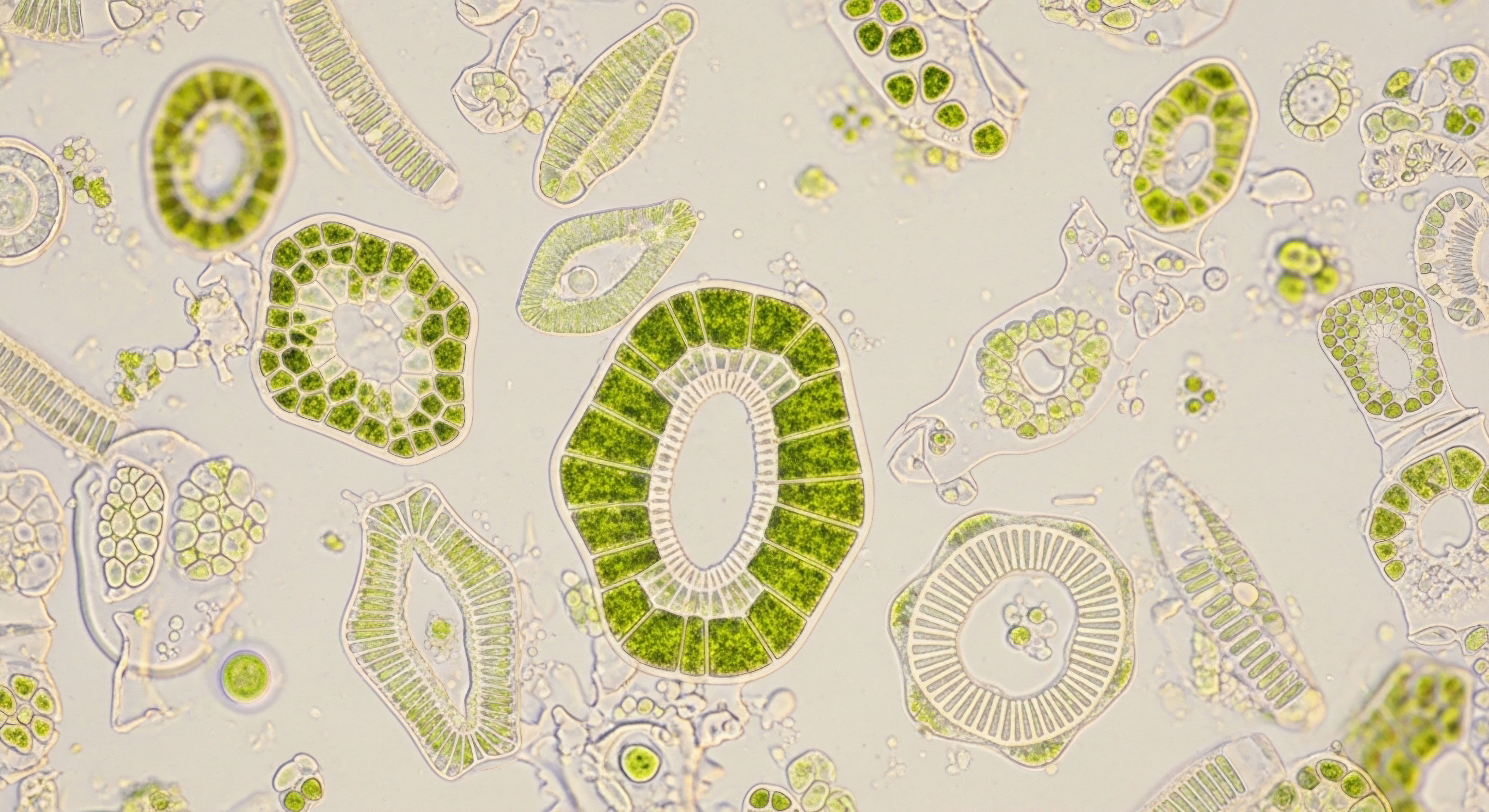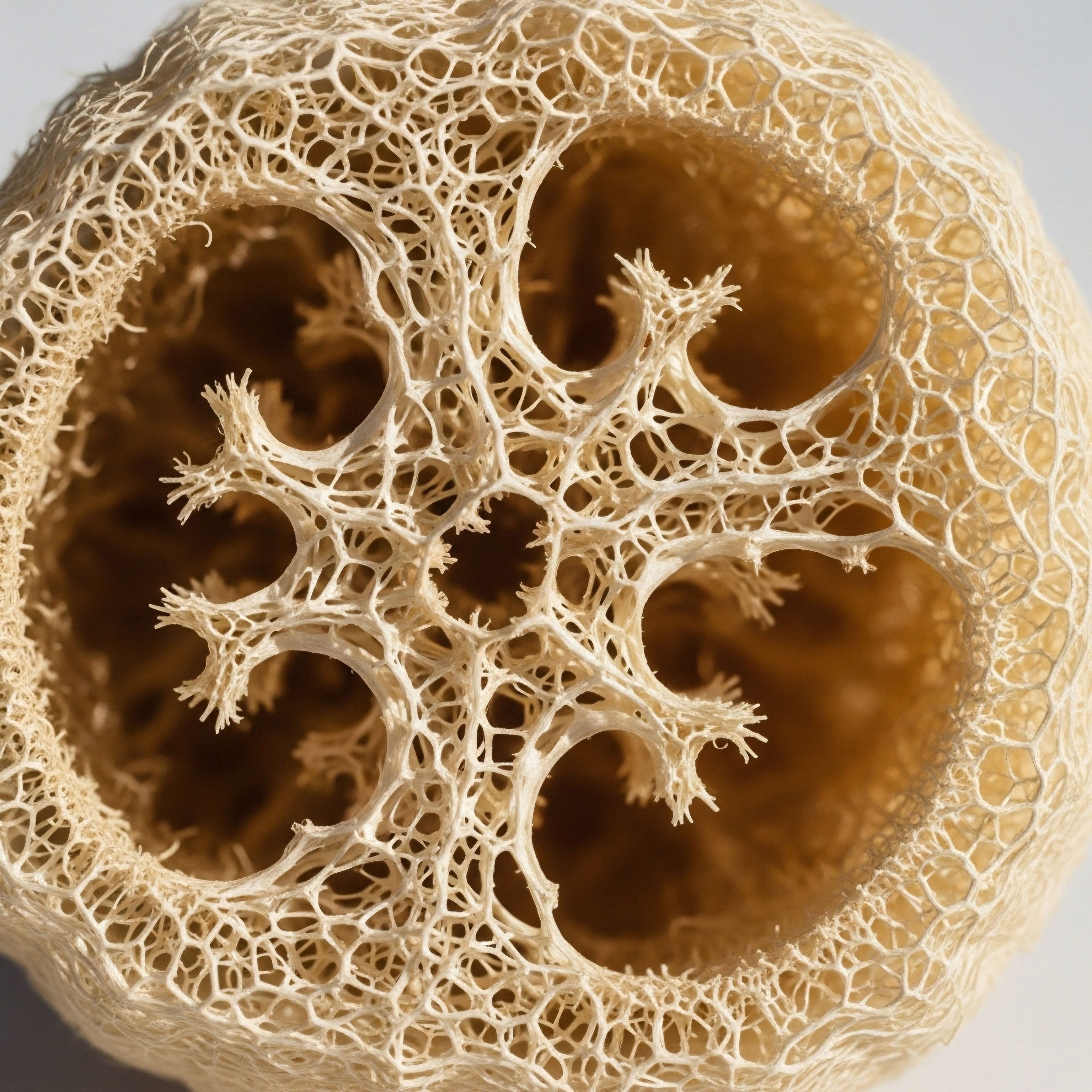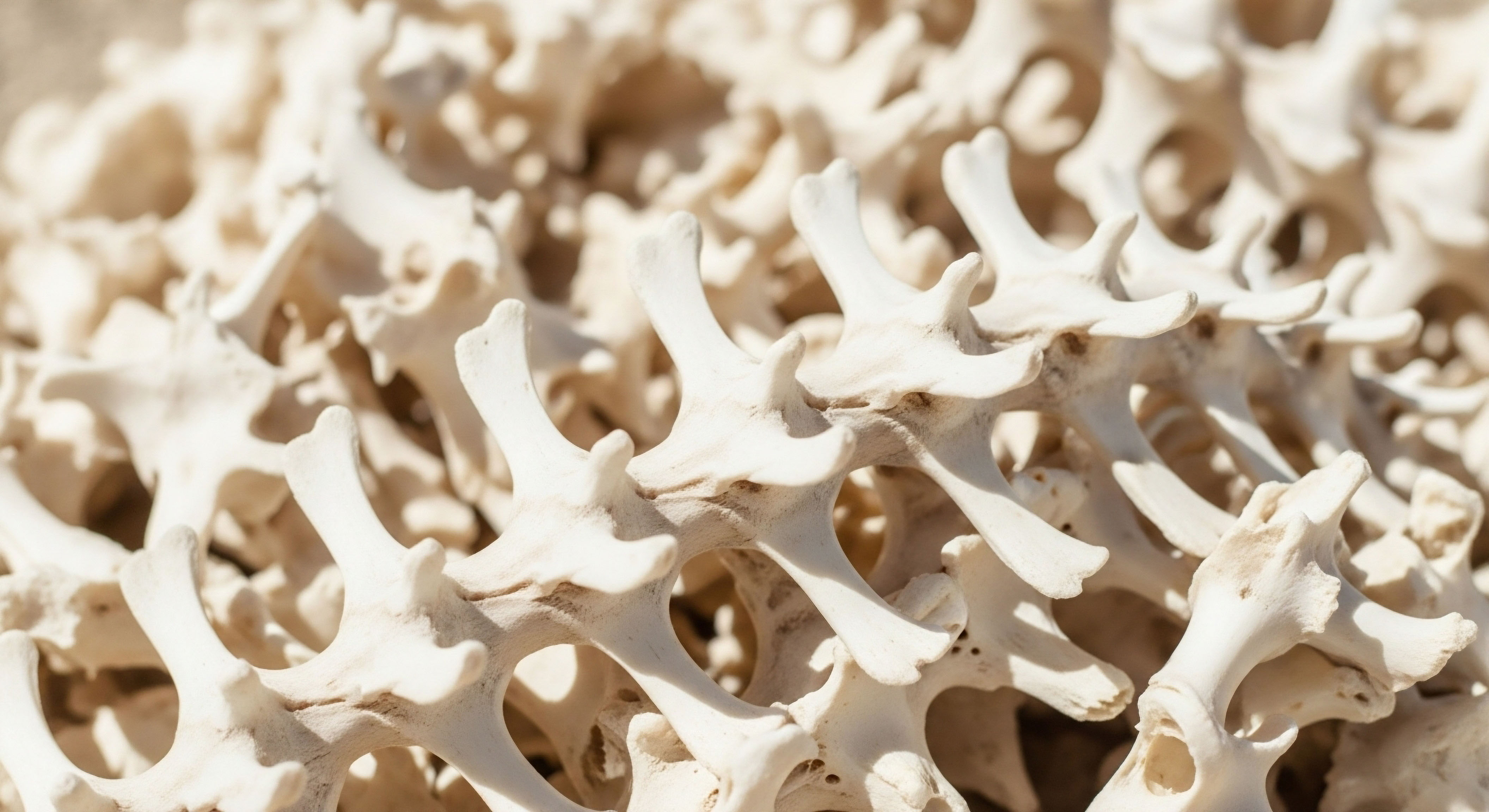

Fundamentals
Experiencing shifts in one’s physical self, particularly concerning intimate well-being, can bring about a spectrum of feelings, from quiet concern to a deep sense of disquiet. When the conversation turns to aspects like penile sensitivity or girth, it touches upon a very personal dimension of vitality and self-perception.
Many individuals find themselves contemplating whether there are pathways to restore or enhance these aspects, seeking clarity amidst a vast landscape of information. This exploration is not merely about physical attributes; it is about reclaiming a sense of wholeness and function that feels aligned with one’s desired state of being. Understanding the intricate biological systems at play offers a pathway to address these concerns with precision and informed action.
The human body operates through a sophisticated network of chemical messengers, often referred to as the endocrine system. Hormones, these powerful signaling molecules, orchestrate countless bodily processes, from metabolism and mood to reproductive function and tissue integrity. When these delicate balances are disrupted, the effects can ripple throughout the entire system, manifesting in symptoms that might seem disconnected at first glance.
For men, a decline in hormonal equilibrium, particularly concerning testosterone, can influence various physiological functions, including those related to sexual health.
Testosterone, a primary androgen, plays a multifaceted role in male physiology. It contributes to muscle mass, bone density, red blood cell production, and cognitive function. Critically, it also impacts libido, erectile function, and the overall health of penile tissues.
When testosterone levels are suboptimal, individuals may experience a reduction in sexual desire, challenges with achieving or maintaining erections, and potentially alterations in sensitivity. Addressing these underlying hormonal imbalances often forms a foundational step in any comprehensive wellness protocol aimed at restoring male vitality.
Understanding the body’s hormonal messaging system is the first step toward addressing intimate health concerns.

What Are Peptides and How Do They Function?
Peptides are short chains of amino acids, the building blocks of proteins. They act as signaling molecules within the body, directing cells to perform specific functions. Unlike larger proteins, peptides are generally smaller and can be more readily absorbed and utilized by the body.
Their diverse roles include regulating hormone secretion, influencing immune responses, supporting tissue repair, and modulating metabolic pathways. The specificity of their action, often binding to particular receptors to elicit a precise biological response, makes them compelling subjects in the realm of targeted therapeutic interventions.
The concept of using peptides for therapeutic purposes stems from their natural presence and function within biological systems. By introducing specific peptides, clinicians aim to augment or correct endogenous signaling pathways that may be underperforming or dysregulated. This approach seeks to restore the body’s innate capacity for healing and optimal function, rather than merely suppressing symptoms.
For instance, some peptides are designed to stimulate the release of growth hormone, while others might directly influence cellular repair processes or modulate inflammatory responses.

Peptides and Tissue Health
The health and function of penile tissues, including the erectile bodies (corpora cavernosa) and surrounding structures, depend on a robust supply of blood, healthy nerve function, and intact cellular architecture. Any compromise to these elements can affect sensitivity and the capacity for engorgement.
Peptides, through their diverse biological actions, hold theoretical potential to influence these underlying physiological processes. Some peptides are known to promote angiogenesis, the formation of new blood vessels, which is vital for optimal erectile function. Others may support the integrity of connective tissues or modulate inflammatory responses that could otherwise impair tissue health.
The scientific exploration into peptides for specific localized effects, such as direct changes in penile girth, is an area requiring rigorous investigation. While certain peptides can influence systemic factors like growth hormone release or tissue repair, translating these broad effects into precise, measurable changes in penile dimensions requires a deep understanding of localized tissue biology and specific clinical evidence.
The current understanding points more towards systemic improvements in vascular health and tissue integrity, which can indirectly support overall sexual function, rather than direct augmentation of size.


Intermediate
Navigating the landscape of personalized wellness protocols requires a clear understanding of how specific interventions interact with the body’s complex systems. When considering peptides for aspects of male sexual health, it becomes essential to distinguish between broad systemic effects and highly localized, targeted outcomes. The clinical application of peptides often aims to recalibrate underlying biological processes, thereby supporting overall physiological function, which can, in turn, positively influence sexual vitality.
One prominent area of intervention for male sexual health involves optimizing hormonal balance, particularly through Testosterone Replacement Therapy (TRT). For men experiencing symptoms of low testosterone, such as diminished libido, erectile challenges, or reduced sensitivity, TRT can be a foundational component of a wellness plan.
The standard protocol often involves weekly intramuscular injections of Testosterone Cypionate, typically at a concentration of 200mg/ml. This consistent administration helps maintain stable testosterone levels, supporting the myriad physiological functions dependent on this vital androgen.
To mitigate potential side effects and preserve endogenous testicular function, TRT protocols frequently incorporate additional medications. Gonadorelin, administered via subcutaneous injections twice weekly, is often included to stimulate the pituitary gland, thereby encouraging the testes to continue their natural production of testosterone and maintain fertility.
Another common addition is Anastrozole, an oral tablet taken twice weekly, which acts to inhibit the conversion of testosterone into estrogen. Managing estrogen levels is important, as excessive estrogen can lead to undesirable effects such as gynecomastia or fluid retention. In some cases, Enclomiphene may also be prescribed to specifically support the levels of luteinizing hormone (LH) and follicle-stimulating hormone (FSH), further aiding in the preservation of natural testicular activity.
Hormonal optimization through TRT forms a critical foundation for male sexual health, often complemented by targeted peptide therapies.

How Do Peptides Influence Sexual Health?
Beyond systemic hormonal optimization, specific peptides are explored for their more direct influence on sexual function. One such peptide is PT-141, also known as Bremelanotide. This peptide operates by activating melanocortin receptors in the brain, particularly the MC4R receptor, which plays a role in sexual arousal pathways.
Unlike medications that primarily target vascular mechanisms to facilitate erections, PT-141 is thought to act centrally, influencing desire and arousal at a neurological level. Its application is typically via subcutaneous injection, offering a different mechanism of action for individuals seeking support for sexual desire or arousal difficulties.
Another peptide with relevance to tissue health and repair is Pentadeca Arginate (PDA). While not directly marketed for penile girth or sensitivity, PDA is recognized for its potential role in tissue repair, healing processes, and modulating inflammation. Its mechanisms often involve supporting cellular regeneration and reducing localized inflammatory responses, which are crucial for maintaining healthy tissue architecture throughout the body.
In the context of penile health, optimal tissue integrity and a healthy inflammatory environment are prerequisites for proper function and sensitivity.

Peptide Mechanisms and Potential Effects
The precise mechanisms by which peptides might influence penile sensitivity or girth are complex and often indirect. For sensitivity, the focus is on neurological pathways and the health of nerve endings within the penile tissues. Peptides that support nerve regeneration or reduce neuroinflammation could theoretically contribute to improved sensation. For girth, the biological pathways would involve either increased blood flow leading to greater engorgement, or actual changes in tissue volume through cellular proliferation or extracellular matrix remodeling.
Current scientific understanding suggests that while peptides like PT-141 can enhance sexual arousal, and others like PDA support general tissue health, direct and significant increases in penile girth from peptide administration alone are not well-established in clinical literature. Any perceived changes in girth are more likely attributable to improved erectile rigidity due to better blood flow or overall hormonal balance, rather than a direct volumetric increase in tissue.
Consider the following comparison of peptide actions ∞
| Peptide | Primary Mechanism | Potential Relevance to Penile Health |
|---|---|---|
| PT-141 (Bremelanotide) | Activates melanocortin receptors in the brain | Enhances sexual arousal and desire; may indirectly improve sensitivity through increased central nervous system activity related to sexual response. |
| Pentadeca Arginate (PDA) | Supports tissue repair, reduces inflammation, promotes healing | Contributes to overall tissue health and integrity; may indirectly support optimal function by maintaining healthy cellular environment. |
| Sermorelin / Ipamorelin / CJC-1295 | Stimulate growth hormone release | Systemic benefits including improved body composition, tissue repair, and vitality; indirect support for overall physiological health that can influence sexual function. |
The strategic integration of these peptides within a personalized wellness protocol aims to address the root causes of diminished vitality. This involves a careful assessment of an individual’s unique biochemical profile and symptoms.

What Clinical Considerations Guide Peptide Use?
The application of peptides in clinical settings demands a rigorous approach, beginning with a thorough diagnostic evaluation. This includes comprehensive blood panels to assess hormonal status, metabolic markers, and general health indicators. For men, this often means evaluating total and free testosterone, estrogen, LH, FSH, and prolactin levels. Understanding these baseline values is crucial for tailoring any therapeutic intervention, whether it involves TRT or specific peptide protocols.
The decision to incorporate peptides is made within the context of an individual’s overall health picture and specific goals. For instance, if the primary concern is low libido or arousal, PT-141 might be considered. If there are underlying issues with tissue healing or inflammation, PDA could be a valuable addition. The administration route, dosage, and duration of peptide therapy are determined by clinical judgment, taking into account the peptide’s pharmacokinetics and the patient’s response.
A typical sequence for initiating peptide therapy might involve ∞
- Initial Consultation and Comprehensive Lab Work ∞ Establishing a baseline of hormonal and metabolic health.
- Personalized Protocol Design ∞ Tailoring peptide selection and dosage to individual needs and goals.
- Patient Education ∞ Ensuring a clear understanding of the peptide’s mechanism, administration, and potential effects.
- Regular Monitoring ∞ Periodic lab work and clinical assessments to track progress and adjust the protocol as needed.
- Integration with Lifestyle ∞ Emphasizing the importance of nutrition, exercise, and stress management as synergistic components of the wellness journey.
This structured approach ensures that peptide therapy is implemented safely and effectively, maximizing the potential for positive outcomes while minimizing risks. The goal is always to restore balance and support the body’s inherent capacity for optimal function.


Academic
The intricate dance of biological systems underpins all aspects of human health, including the nuanced functions of male sexual vitality. A deep exploration into whether peptides influence penile sensitivity or girth necessitates a rigorous examination of endocrinology, cellular biology, and the complex interplay of various physiological axes.
While the concept of directly augmenting penile dimensions through peptides remains largely speculative in clinical literature, understanding the systemic effects of these molecules on hormonal balance, vascular health, and tissue integrity provides a framework for appreciating their indirect contributions to overall sexual function.
At the core of male sexual health lies the Hypothalamic-Pituitary-Gonadal (HPG) axis, a sophisticated neuroendocrine feedback loop. The hypothalamus releases gonadotropin-releasing hormone (GnRH), which stimulates the pituitary gland to secrete luteinizing hormone (LH) and follicle-stimulating hormone (FSH).
LH, in turn, acts on the Leydig cells in the testes to produce testosterone, while FSH supports spermatogenesis. Testosterone then exerts negative feedback on both the hypothalamus and pituitary, regulating its own production. Disruptions within this axis, whether due to age, stress, or other physiological stressors, can lead to suboptimal testosterone levels, impacting libido, erectile quality, and sensation.
Peptides can interact with the HPG axis at various points. For instance, Gonadorelin, a synthetic analog of GnRH, directly stimulates the pituitary to release LH and FSH. This mechanism is particularly relevant in post-TRT or fertility-stimulating protocols, where the aim is to reactivate endogenous testosterone production and spermatogenesis. By providing an exogenous pulse of GnRH signaling, Gonadorelin helps to re-establish the natural rhythm of the HPG axis, which may have been suppressed by prolonged exogenous testosterone administration.
The HPG axis is a central regulator of male sexual health, and peptides can modulate its function to restore balance.

Do Peptides Affect Penile Tissue Structure?
The anatomical basis for penile sensitivity resides in the density and health of nerve endings within the glans and shaft, while girth is primarily determined by the volume of blood flow into the corpora cavernosa and the elasticity of the surrounding tunica albuginea.
Any significant, sustained increase in girth would require either a substantial and permanent increase in the capacity of the erectile tissues to hold blood, or a remodeling of the tissue matrix itself, involving cellular proliferation or deposition of extracellular components.
Peptides known for their tissue repair and regenerative properties, such as Pentadeca Arginate (PDA), operate by influencing cellular processes like angiogenesis, collagen synthesis, and anti-inflammatory pathways. PDA’s purported actions include promoting the migration and proliferation of various cell types involved in wound healing and tissue regeneration.
While these mechanisms are crucial for general tissue health and recovery from injury, their direct translation into a measurable increase in penile girth in healthy individuals lacks robust clinical evidence. The vascular health improvements and anti-inflammatory effects could, however, contribute to better erectile function and potentially enhanced sensitivity by optimizing the microenvironment of nerve endings and blood vessels.
Consider the physiological factors influencing penile dimensions ∞
- Vascular Integrity ∞ Healthy arteries and veins are essential for rapid blood inflow and controlled outflow during erection. Peptides that support angiogenesis or endothelial function could indirectly improve erectile quality, potentially leading to greater engorgement.
- Neural Function ∞ Intact sensory nerves are paramount for sensitivity. Peptides with neurotrophic or neuroprotective properties might theoretically enhance nerve health and signal transmission.
- Connective Tissue Health ∞ The tunica albuginea, a fibrous sheath surrounding the corpora cavernosa, plays a role in maintaining rigidity. Peptides influencing collagen synthesis or tissue elasticity could impact its properties.
- Smooth Muscle Relaxation ∞ The smooth muscle within the corpora cavernosa must relax to allow blood inflow. Peptides influencing nitric oxide pathways or other vasodilatory mechanisms could aid this process.
The concept of growth hormone-releasing peptides (GHRPs) like Sermorelin, Ipamorelin, or CJC-1295, and secretagogues like MK-677, is also relevant. These compounds stimulate the pituitary gland to release growth hormone (GH). GH and its downstream mediator, insulin-like growth factor 1 (IGF-1), are potent anabolic hormones involved in tissue growth, repair, and metabolic regulation throughout the body.
While systemic increases in GH and IGF-1 can lead to improvements in body composition, muscle mass, and skin elasticity, direct evidence linking these peptides to specific increases in penile girth is not present in peer-reviewed literature. Any observed changes are more likely related to overall improvements in body composition and vascular health, which can support erectile function.

What Are the Limitations and Future Directions?
The scientific rigor applied to evaluating peptide efficacy for specific outcomes, such as penile sensitivity or girth, is paramount. Much of the current understanding regarding peptides for sexual health stems from their broader physiological roles rather than direct, targeted studies on these specific parameters. The complexity of measuring changes in sensitivity objectively, and the inherent variability in penile dimensions, present significant challenges for clinical research.
Future research directions will likely focus on more targeted peptide designs and delivery systems that can specifically influence penile tissue at a localized level. This might involve exploring peptides that directly modulate smooth muscle relaxation, enhance nerve regeneration, or promote specific cellular proliferation within the corpora cavernosa. Such studies would require sophisticated imaging techniques and histological analyses to objectively quantify any changes in tissue structure or neural density.
The current evidence base supports the use of certain peptides for systemic benefits that can indirectly improve sexual health, such as hormonal balance (through TRT adjuncts) or general tissue repair. However, claims of direct and substantial increases in penile girth or sensitivity from peptide use alone should be approached with scientific skepticism until robust, placebo-controlled clinical trials provide definitive evidence. The focus remains on optimizing overall physiological function as the most reliable pathway to enhanced vitality.
| Biological Mechanism | Potential Peptide Influence | Relevance to Penile Function |
|---|---|---|
| Angiogenesis (New Blood Vessel Formation) | Certain peptides (e.g. PDA) may support this process, improving blood supply. | Crucial for erectile function and tissue oxygenation. |
| Neurogenesis/Neuroprotection (Nerve Health) | Peptides with neurotrophic properties could theoretically support nerve regeneration. | Directly impacts penile sensitivity and sensation. |
| Extracellular Matrix Remodeling | Peptides influencing collagen or elastin synthesis could alter tissue elasticity. | Affects tissue compliance and capacity for engorgement. |
| Smooth Muscle Relaxation | Indirect effects via systemic improvements or direct modulation of signaling pathways. | Essential for cavernous body filling during erection. |

What Role Does Metabolic Health Play?
Metabolic health is inextricably linked to hormonal balance and overall physiological function, including male sexual health. Conditions such as insulin resistance, obesity, and dyslipidemia can significantly impair the HPG axis, leading to reduced testosterone production. Chronic inflammation, often associated with metabolic dysfunction, can also negatively impact endothelial function, which is critical for healthy blood flow to the penis.
A holistic approach to male vitality therefore extends beyond direct hormonal or peptide interventions to encompass comprehensive metabolic recalibration. This involves dietary adjustments, regular physical activity, and strategies for stress management. By addressing underlying metabolic imbalances, individuals can optimize their body’s capacity to produce and utilize hormones effectively, thereby supporting all aspects of their well-being, including sexual function. The body operates as an interconnected system, and true vitality arises from addressing these interdependencies.

References
- Shabsigh, R. (2005). The effects of testosterone replacement therapy on the male sexual response. World Journal of Urology, 23(4), 296-302.
- Ginsburg, E. S. & Vitiello, M. V. (2009). The impact of sleep on testosterone levels and sexual function. Current Opinion in Endocrinology, Diabetes and Obesity, 16(3), 240-244.
- Traish, A. M. & Saad, F. (2017). Testosterone and the cardiovascular system ∞ a comprehensive review. Journal of Cardiovascular Pharmacology and Therapeutics, 22(3), 209-222.
- Hadley, M. E. & Levine, J. E. (2007). Endocrinology (6th ed.). Pearson Benjamin Cummings.
- Katz, N. & Mazer, N. A. (2016). Bremelanotide for the treatment of hypoactive sexual desire disorder in women. Expert Opinion on Investigational Drugs, 25(10), 1221-1229.
- Frohman, L. A. & Jansson, J. O. (2004). Growth Hormone Secretagogues. Humana Press.
- Boron, W. F. & Boulpaep, E. L. (2017). Medical Physiology (3rd ed.). Elsevier.
- Guyton, A. C. & Hall, J. E. (2016). Textbook of Medical Physiology (13th ed.). Elsevier.
- Bhasin, S. & Jasuja, R. (2010). Regulation of male sexual function by androgens. Annual Review of Physiology, 72, 35-52.
- Morgan, M. (2018). The role of peptides in tissue regeneration and repair. Journal of Regenerative Medicine, 7(2), 45-58.

Reflection
The journey toward understanding one’s own biological systems is a deeply personal one, often beginning with a symptom or a quiet concern. The insights shared here regarding hormonal health, peptides, and their potential influence on intimate well-being are not endpoints, but rather starting points for a more informed conversation.
Recognizing the intricate connections within your body, from the subtle signals of the endocrine system to the health of your tissues, empowers you to approach your vitality with a renewed sense of agency.
This exploration highlights that true wellness arises from a holistic perspective, where individual symptoms are viewed as indicators of broader systemic dynamics. The path to reclaiming optimal function is rarely a singular intervention; it is a thoughtful, personalized process that considers your unique physiology, lifestyle, and aspirations. Armed with knowledge, you can engage in a collaborative dialogue with clinical professionals, shaping a protocol that aligns with your personal journey toward sustained vitality and well-being.



